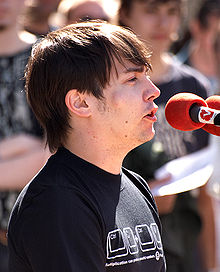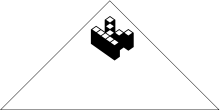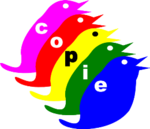- Piratbyrån
-
Piratbyrån
 Piratbyrån (help·info) ("The Pirate Bureau") was a Swedish organization (or think tank) established to support people opposed to current ideas about intellectual property — by freely sharing information and culture. Piratbyrån wishes to give another point of view about spreading information as opposed to certain lobby groups.
Piratbyrån (help·info) ("The Pirate Bureau") was a Swedish organization (or think tank) established to support people opposed to current ideas about intellectual property — by freely sharing information and culture. Piratbyrån wishes to give another point of view about spreading information as opposed to certain lobby groups.In 2005 Piratbyrån released an anthology entitled Copy Me [1] containing selected texts previously available from its website. Members of Piratbyrån have participated in debates on Swedish Radio and Swedish Television and have also been giving several lectures in other European countries, such as at the 2005 22nd Chaos Communication Congress in Berlin.[2]
Piratbyrån's activities might have changed over the years, partly as a result of the addition of the Pirate Party to the Swedish political scene. During Walpurgis Night 2007, Piratbyrån burned all of their remaining copies of Copy Me in a ritual-like performance, declaring:
The file-sharing debate is hereby buried. When we talk about file-sharing from now on it's as one of many ways to copy. We talk about better and worse ways of indexing, archiving and copying—not whether copying is right or wrong. Winter is pouring down the hillside. Make way for spring![3]
Jonas Andersson, a Swedish researcher specialized in the politics of file-sharing, gave this brief definition in October 2009:
Piratbyrån is entirely separate from The Pirate Party; it is more of a loosely organised think-tank, a website, a philosophical greenhouse or FAQ guide to digitization.[4]
The MPAA-funded Svenska Antipiratbyrån (Swedish Anti-Piracy Agency), an agency devoted to fighting pirating of copyrighted material, was formed in 2001, before Piratbyrån. Piratbyrån humorously copied the name of their opponent, removing the "anti".[5]
In June 2010 the group disbanded following the death of Ibi Kopimi Botani.[5]
Contents
Self-definition
In 2008 Piratbyrån published a report titled Piratbyrån - The Bureau of Piracy Activities 2007 which starts with the following description of the organisation:
Piratbyrån (The Bureau of Piracy) is not an organization, at least not primarily. First and foremost, Piratbyrån is since its beginning in 2003 an ongoing conversation. We are reflecting over questions regarding copying, information infrastructure and digital culture. Within the group, using our own different experiences and skills, as in our daily encounters with other people. These conversations often bring about different kinds of activities.—[6]Definition by Prix Ars Electronica jury
As Piratbyrån received an "award of distinction" at Prix Ars Electronica in 2009,[7][8] the jury statement said:
Piratbyrån is not an organization but an on-going conversation on copyright, file-sharing and digital culture. Over the last six years Piratbyrån has been able to create a discursive space that enables individual and collective actors to be heard, and to significantly expand the range of opinions entering the public debate regarding copyright. To advance this conversation, they have been using a wide range of innovative, experimental, often humorous techniques – as well as traditional means such as public discussions, interviews and publications.The resulting debate has been multi-layered ranging from the technological (e.g. The Pirate Bay) to the artistic (e.g. a bus tour through Europe to Manifesta 08) to the political (e.g. Pirate Party). With very limited resources, Piratbyrån has been able to galvanize a political movement that has already shaped the development of digital culture and public policy in Sweden and across Europe, pushing the boundaries of the possible.
Piratbyrån aims at nothing less than to fundamentally question the most basic categories – e.g. the distinction between the producer and the consumer – through which we understand culture in order to investigate if and how these apply to the digital condition.
Piratbyrån does not claim to offer a solution to this extremely complex issue; indeed, it questions the assumption that copyright offers a one-size-fits all solution to cultural production, which now needs to be replaced with another unified solution. All of this has been done with great dedication and under considerable personal risk, yet they never forget that humor and irony are among the strongest weapons available to cultural producers.—[9]BitTorrent tracker
 Rasmus Fleischer, spokesman of Piratbyrån speaking at a demonstration in Stockholm held 3 June 2006.
Rasmus Fleischer, spokesman of Piratbyrån speaking at a demonstration in Stockholm held 3 June 2006.
Members of Piratbyrån founded the BitTorrent tracker The Pirate Bay in 2003 as a Swedish language site. The Pirate Bay now operates independently from Piratbyrån, although a number of The Pirate Bay administrators were also active in Piratbyrån.[10][11]
Police raid
On the morning of May 31, 2006, the servers of both The Pirate Bay, a popular Swedish BitTorrent tracker, and Piratbyrån were confiscated in a raid by Swedish police. The seizure was part of investigation into possible illegal activities on the part of The Pirate Bay. Piratbyrån and the Antipiratbyrån set up a temporary news blog during the investigation.[12][13]
Activities in 2007
In Piratbyrån - The Bureau of Piracy Activities 2007, published in 2008, Piratbyrån list its activities for the year 2007. Activities by Piratbyrån members include lectures at universities and conferences, the publication of reports, participation in art projects and research projects, an interview with Vanity Fair in February 2007, participation in the planning of The Oil of the 21st Century conference in Berlin, presentations at a Norwegian computer party (The Gathering), interviews to the media regarding the raid on The Pirate Bay, opening of a webshop to sell Kopimi Klothing, participation in the organisation of protests to mark the one year anniversary of the police raid on The Pirate Bay, attendance of the BELEF07 festival in Belgrade (Serbia), and participation in the organisation of a one day art event in Stockholm titled "Who Makes And Owns Your Work".[6]
In March 2007 Piratbyrån members were invited to a meeting with the executive group for the Swedish Film Institute, to share their views about film and copying. According to Piratbyrån "The leadership listens with interest — only to some months later launch new anti-piracy initiatives...". In the same month Piratbyrån collaborates with the Norwegian group Piratgruppen, launching the counter-campaign "Piracy frees music" (promoted via The Pirate Bay), in response to the "Piracy kills music" anti-piracy campaign by the Norwegian record industry.[6]
In 2007 members of Piratbyrån also helped in the production of the film Steal This Film (two), which features interviews with Piratbyrån members and was released in December 2007.[6]
Activities in 2009
Piratbyrån organized the "Spectrial", a theatricalizing intervention in The Pirate Bay trial in Stockholm, early in 2009.[14][dead link][citation needed]
Installed the Embassy of Piracy - The Embassy of Piracy, for the First Internet Pavilion at the Venice Biennial[15]
At the Prix Ars Electronica Piratbyrån received an "award of distinction" (including a prize money of 5000 euro) in the category "Digital Communities".[7][8] The motivation of the jury underlined the Piratbyrån "never forget that humor and irony are among the strongest weapons available to cultural producers." [9]
Kopimi
Piratbyrån proposed, and published most of its work under, a copyright alternative called kopimi (pronounced, and sometimes also spelled "copyme").[16] Designed to be the opposite of copyright, a kopimi notice specifically encourages that the work be copied - for any purpose, commercial or non-commercial.[17] Kopimi is similar to the CC0 license created by Creative Commons, although Kopimi adds a positive imperative for others to copy.
The Kopimi page contains various versions of the Kopimi logo, and explains that the logo is a symbol showing that the work is allowed to be copied. Kopimi may be put on homepages or blogs, in books, in software, as sound logos in music, or whatever.[16]
The Kopimi concept and logo was created by Ibi Kopimi Botani (Ibrahim Botani) in 2005. "Some of you may have noticed that little symbol at the bottom of the page, the pyramid. It's a symbol called Kopimi (Copy Me) which was founded by an old friend of ours, the artist Ibi Botani." [18]
Copie
Inspired by Kopimi, the Pirate Party of Brazil created their own version of the concept called "Copie", which plays both on the English word "copy" and the Portuguese "co-pie" or "twit together". The Copie logo shows 5 birds twitting together.[19]
See also
- Anti-copyright
- Copyleft
- Pirate Party (Piratpartiet) (not affiliated with Piratbyrån)
- The Pirate Bay A bittorrent site.
- Steal This Film
- Telecomix
References
- ^ Piratbyrån: Copy Me Retrieved 20 May 2011.
- ^ Palle Torsson and Rasmus Fleischer (December 2005). "Piratbyrån speech at Chaos Communication Congress 22C3 in Berlin". Archived from the original on 6 February 2006. http://web.archive.org/web/20060206151626/http://www.piratbyran.org/index.php?view=articles&id=107. Retrieved 15 July 2010.
- ^ Walpurgis Piratbyran. Retrieved 16 July 2010.
- ^ Andersson, Jonas (13 October 2009). Q&A re Pirate Politics liquidculture notebook (Blog).
- ^ a b Ernesto (23 June 2010). "Pirate Bay’s Founding Group ‘Piratbyrån’ Disbands" Retrieved 23 June 2010.
- ^ a b c d "Piratbyrån – The Bureau of Piracy Activities 2007" (PDF). 2008. http://piratbyran.org/PBverksamhet2007/PB%20activities%202007%20(text%20only).pdf.
- ^ a b oso (9 September 2009). |Ars Electronica| Communities Forum El-Oso.net.
- ^ a b History of Prix Ars Electronica / 2009 Ars Electronica, 2009. Retrieved 17 July 2010.
- ^ a b Fleischer, Rasmus (17 September 2009). Ars Electronica, XI: Definition of Piratbyrån Copyriot.se] Quote of David Sasaki. Retrieved 17 July 2010.
- ^ Harrison, Ann (13 March 2006). "The Pirate Bay: Here to Stay?". Wired. http://www.wired.com/science/discoveries/news/2006/03/70358.
- ^ Ingram, Michael (7 June 2005). "Slyck Interviews The Pirate Bay". Slyck.com. http://www.slyck.com/story819_Slyck_Interviews_The_Pirate_Bay.
- ^ "Piratbyrån Blog". http://piratbyran.blogspot.com/. Retrieved 25 July 2008.
- ^ "Antipiratbyrån Blog". http://www.antipiratbyran.com/index.htm?id=news&p=p19#19. Retrieved 25 July 2008.
- ^ The Pirate Bay Trial website.
- ^ Aman, Jan (September 2009). "In at the Deep End" (PDF). Dazed & Confused.
- ^ a b "Kopimi concept". Kopimi.com. http://www.kopimi.com/kopimi/. Retrieved 25 July 2008.
- ^ "Kopimi Definition". Språkwebb Computer Sweden. IDG.de. http://cstjanster.idg.se/sprakwebben/ord.asp?ord=ide. Retrieved 25 July 2008.
- ^ Pirate Bay History 2007 (June)
- ^ PartidoPirata Brazilian Pirate Party website. Retrieved 17 July 2010.
External links
- Piratbyrån Official Site
- Piratgruppen.org - Danish sister organization
- Art Liberated - Another project from Piratbyrån, highlighting remix culture and opposing censorship of art.
- Slashdot on Piratbyrån's May Day Demonstration 2004
- Press release about Piratbyrån's May Day Demonstration 2005
- The Grey Commons, strategic considerations in the copyfight Text by Piratbyrån's Palle Torsson and Rasmus Fleischer, presenting the activities of 2005.
- The Pirate Bay and Piratbyrån taken down by Police
- Between artworks and networks: Navigating through the crisis of copyright Theoretical lecture by Piratbyrån's Rasmus Fleischer.
- Presentation of Piratbyrån by Magnus Eriksson, from the Bzoom festival in Brno, October 2006.
Intellectual property activism Issues and debates Copyright infringement · Criticism of intellectual property · Criticism of patents · Digital rights management · Gripe site · History of music piracy · Mashup videos and music · Public domain · Software patent debateConcepts Movements Organizations Creative Commons · Electronic Frontier Foundation · Free Software Foundation · Open Rights Group · The Pirate Bay · Piratbyrån · Pirate Party · Students for Free CultureDocumentaries Categories:- Intellectual property activism
- Politics of Sweden
- Political and economic think tanks based in Europe
- Science and technology think tanks
- Think tanks based in Sweden
Wikimedia Foundation. 2010.


